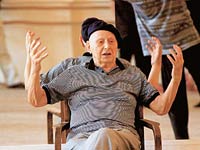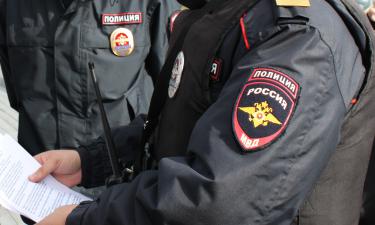Legendary Russian choreographer Igor Moiseyev dies at age 101
Igor Moiseyev, a legendary choreographer who transformed folk dance into a legitimate genre for world choreography, died Friday in Moscow, Russian news agencies reported. He was 101.

Dubbed the king of folk dance, Moiseyev infatuated the West with Russian culture at a time of deep hostility and won standing ovations across the globe.
Moiseyev brought traditional folk dance onto the professional stage by combining ethnic moves with classic ballet. His numbers - from the Russian peasant girl dance to the Greek Sirtaki - were hailed for promoting peace and tolerance by showing that cultures are numerous and each is unique. He amazed Americans with his take on rock 'n' roll and square dance.
Moiseyev had been in poor health and was rarely seen in public in recent years. Looking very frail, he made an appearance at a Moscow concert to celebrate his 100th birthday last year.
Igor Alexandrovich Moiseyev was born in Kiev on January 21 1906. He has been widely acclaimed as the greatest 20th-century choreographer of folk dance. Moiseyev graduated from the Bolshoi Theatre ballet school in 1924 and danced in the theatre until 1939. His first choreography in the Bolshoi was Footballer in 1930 and the last was Spartacus in 1954.
Since the early 1930s, he staged acrobatic parades on Red Square and finally came up with the idea of establishing the Theatre of Folk Art. In 1936, Vyacheslav Molotov put him in charge of the new dance company, which has since been known as the Moiseyev Ballet. Among about 200 dances he created for his company, some humorously represented the game of football and guerrilla warfare. After visiting Belarus he choreographed a Belarusian "folk" dance Bulba ("Potato"), which over the years indeed became a Belarusian folk dance. According to the Encyclopædia Britannica, Moiseyev's work has been especially admired "for the balance that it maintained between authentic folk dance and theatrical effectiveness".
Moiseyev was named People's Artist of the USSR in 1953, Hero of Socialist Labor in 1976, received the Lenin Prize (1967, for the dance show A Road to the Dance), four USSR State Prizes (1942, 1947, 1952, 1985), Russian Federation State Prize (1996), was awarded numerous orders and medals of the Soviet Union, Spain and many other countries. On the day of his centenary, Moiseyev became the first Russian to receive Order for the Merits before the Fatherland, 1st class — the highest civilian decoration of the Russian Federation.
Subscribe to Pravda.Ru Telegram channel, Facebook, RSS!




